宾语和同位语从句(DOC)
- 格式:doc
- 大小:92.01 KB
- 文档页数:10
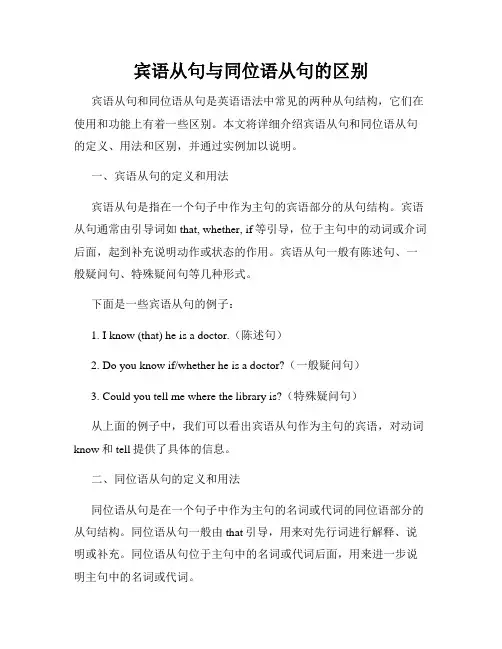
宾语从句与同位语从句的区别宾语从句和同位语从句是英语语法中常见的两种从句结构,它们在使用和功能上有着一些区别。
本文将详细介绍宾语从句和同位语从句的定义、用法和区别,并通过实例加以说明。
一、宾语从句的定义和用法宾语从句是指在一个句子中作为主句的宾语部分的从句结构。
宾语从句通常由引导词如that, whether, if等引导,位于主句中的动词或介词后面,起到补充说明动作或状态的作用。
宾语从句一般有陈述句、一般疑问句、特殊疑问句等几种形式。
下面是一些宾语从句的例子:1. I know (that) he is a doctor.(陈述句)2. Do you know if/whether he is a doctor?(一般疑问句)3. Could you tell me where the library is?(特殊疑问句)从上面的例子中,我们可以看出宾语从句作为主句的宾语,对动词know和tell提供了具体的信息。
二、同位语从句的定义和用法同位语从句是在一个句子中作为主句的名词或代词的同位语部分的从句结构。
同位语从句一般由that引导,用来对先行词进行解释、说明或补充。
同位语从句位于主句中的名词或代词后面,用来进一步说明主句中的名词或代词。
下面是一些同位语从句的例子:1. The fact that he passed the exam pleased his parents.(同位语从句解释了fact这个名词)2. My belief is that everyone should be treated equally.(同位语从句解释了belief这个名词)3. Her idea is that we should travel together.(同位语从句解释了idea这个名词)从上面的例子中,我们可以看出同位语从句解释或说明了先行词所表示的名词或代词。
三、1. 位置不同:宾语从句位于主句的动词或介词后,作为主句的宾语部分。
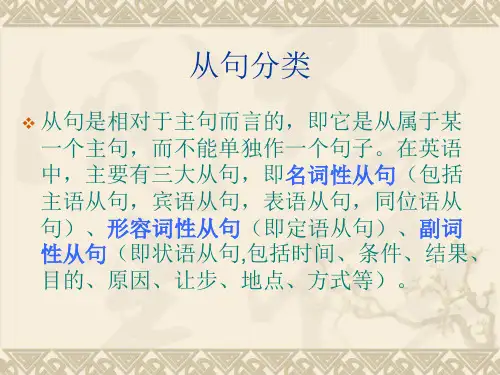
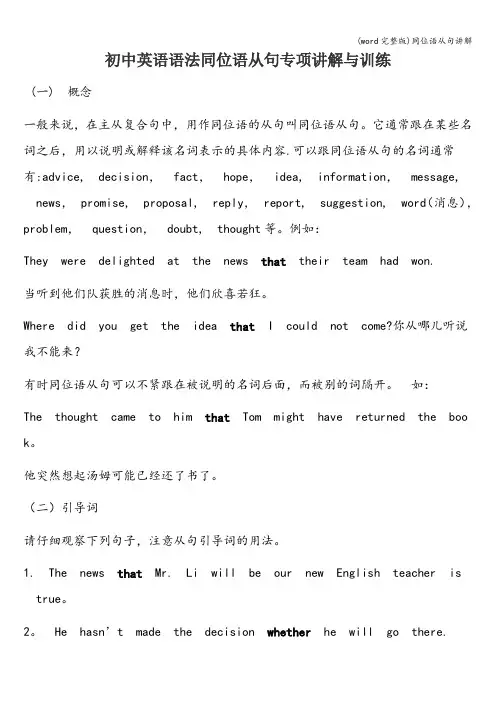
初中英语语法同位语从句专项讲解与训练(一) 概念一般来说,在主从复合句中,用作同位语的从句叫同位语从句。
它通常跟在某些名词之后,用以说明或解释该名词表示的具体内容.可以跟同位语从句的名词通常有:advice, decision,fact,hope,idea, information,message, news,promise, proposal, reply,report, suggestion, word(消息),problem,question,doubt, thought等。
例如:They were delighted at the news that their team had won.当听到他们队获胜的消息时,他们欣喜若狂。
Where did you get the idea that I could not come?你从哪儿听说我不能来?有时同位语从句可以不紧跟在被说明的名词后面,而被别的词隔开。
如:The thought came to him that Tom might have returned the boo k。
他突然想起汤姆可能已经还了书了。
(二)引导词请仔细观察下列句子,注意从句引导词的用法。
1. The news that Mr. Li will be our new English teacher istrue。
2。
He hasn’t made the decision whether he will go there.3。
The question who should do the work is being discussed a t the meeting4. I have no idea what the boy is doing in the next room now.5. We haven’t yet settled the question where we are going t o spend our summer vacation this year。
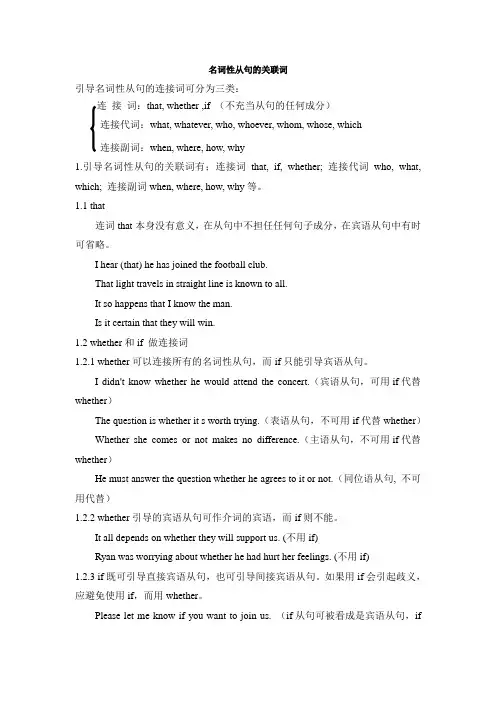
名词性从句的关联词引导名词性从句的连接词可分为三类:连接词:that, whether ,if (不充当从句的任何成分)连接代词:what, whatever, who, whoever, whom, whose, which连接副词:when, where, how, why1.引导名词性从句的关联词有;连接词that, if, whether; 连接代词who, what, which; 连接副词when, where, how, why等。
1.1 that连词that本身没有意义,在从句中不担任任何句子成分,在宾语从句中有时可省略。
I hear (that) he has joined the football club.That light travels in straight line is known to all.It so happens that I know the man.Is it certain that they will win.1.2 whether和if 做连接词1.2.1 whether可以连接所有的名词性从句,而if只能引导宾语从句。
I didn't know whether he would attend the concert.(宾语从句,可用if代替whether)The question is whether it s worth trying.(表语从句,不可用if代替whether)Whether she comes or not makes no difference.(主语从句,不可用if代替whether)He must answer the question whether he agrees to it or not.(同位语从句, 不可用代替)1.2.2 whether引导的宾语从句可作介词的宾语,而if则不能。
It all depends on whether they will support us. (不用if)Ryan was worrying about whether he had hurt her feelings. (不用if)1.2.3 if既可引导直接宾语从句,也可引导间接宾语从句。
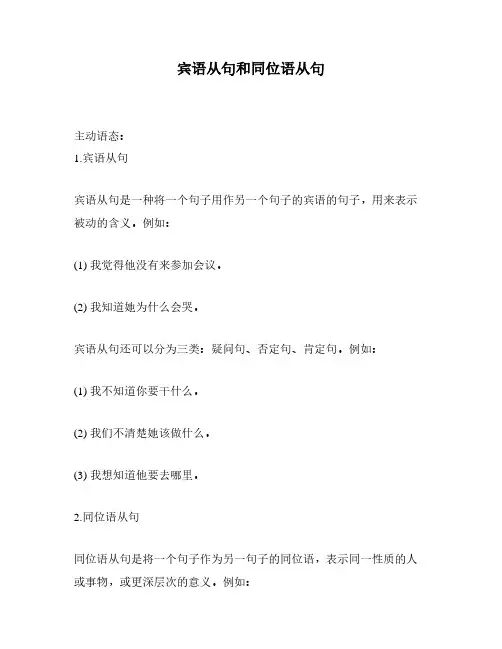
宾语从句和同位语从句
主动语态:
1.宾语从句
宾语从句是一种将一个句子用作另一个句子的宾语的句子,用来表示被动的含义。
例如:
(1) 我觉得他没有来参加会议。
(2) 我知道她为什么会哭。
宾语从句还可以分为三类:疑问句、否定句、肯定句。
例如:
(1) 我不知道你要干什么。
(2) 我们不清楚她该做什么。
(3) 我想知道他要去哪里。
2.同位语从句
同位语从句是将一个句子作为另一句子的同位语,表示同一性质的人或事物,或更深层次的意义。
例如:
(1) 他是一位商人,这是事实。
(2) 吃一顿饭只需要十分钟,这是他的建议。
同位语从句也可以分为三类:疑问句、否定句、肯定句。
例如:
(1) 她要不要去这里还没有确定,这是我的问题。
(2) 他的病并不能得到治愈,这是大家知道的事实。
(3) 我不关心他要说什么,这是我的态度。
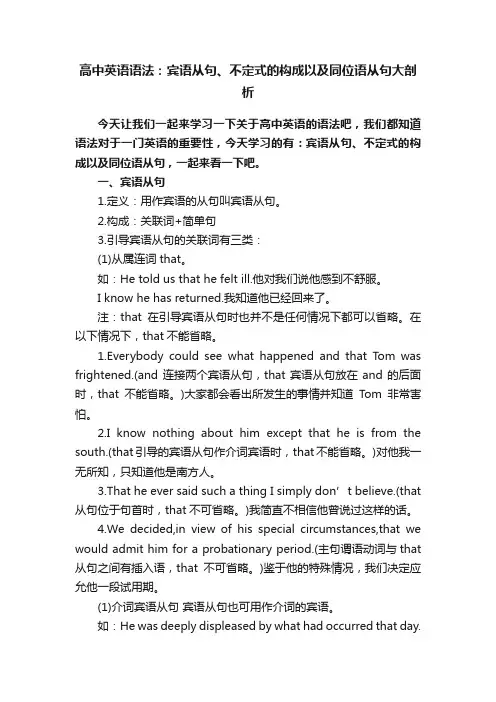
高中英语语法:宾语从句、不定式的构成以及同位语从句大剖析今天让我们一起来学习一下关于高中英语的语法吧,我们都知道语法对于一门英语的重要性,今天学习的有:宾语从句、不定式的构成以及同位语从句,一起来看一下吧。
一、宾语从句1.定义:用作宾语的从句叫宾语从句。
2.构成:关联词+简单句3.引导宾语从句的关联词有三类:(1)从属连词that。
如:He told us that he felt ill.他对我们说他感到不舒服。
I know he has returned.我知道他已经回来了。
注:that在引导宾语从句时也并不是任何情况下都可以省略。
在以下情况下,that不能省略。
1.Everybody could see what happened and that T om was frightened.(and连接两个宾语从句,that宾语从句放在and的后面时,that不能省略。
)大家都会看出所发生的事情并知道T om非常害怕。
2.I know nothing about him except that he is from the south.(that引导的宾语从句作介词宾语时,that不能省略。
)对他我一无所知,只知道他是南方人。
3.That he ever said such a thing I simply don’t believe.(that 从句位于句首时,that不可省略。
)我简直不相信他曾说过这样的话。
4.We decided,in view of his special circumstances,that we would admit him for a probationary period.(主句谓语动词与that 从句之间有插入语,that不可省略。
)鉴于他的特殊情况,我们决定应允他一段试用期。
(1)介词宾语从句宾语从句也可用作介词的宾语。
如:He was deeply displeased by what had occurred that day.他对那天发生的事感到很不快。
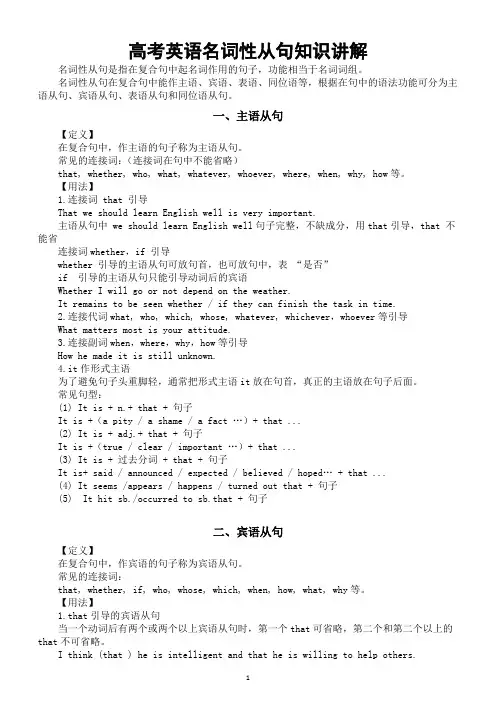
高考英语名词性从句知识讲解名词性从句是指在复合句中起名词作用的句子,功能相当于名词词组。
名词性从句在复合句中能作主语、宾语、表语、同位语等,根据在句中的语法功能可分为主语从句、宾语从句、表语从句和同位语从句。
一、主语从句【定义】在复合句中,作主语的句子称为主语从句。
常见的连接词:(连接词在句中不能省略)that, whether, who, what, whatever, whoever, where, when, why, how等。
【用法】1.连接词 that 引导That we should learn English well is very important.主语从句中 we should learn English well句子完整,不缺成分,用that引导,that 不能省连接词whether,if 引导whether 引导的主语从句可放句首,也可放句中,表“是否”if 引导的主语从句只能引导动词后的宾语Whether I will go or not depend on the weather.It remains to be seen whether / if they can finish the task in time.2.连接代词what, who, which, whose, whatever, whichever,whoever等引导What matters most is your attitude.3.连接副词when,where,why,how等引导How he made it is still unknown.4.it作形式主语为了避免句子头重脚轻,通常把形式主语it放在句首,真正的主语放在句子后面。
常见句型:(1) It is + n.+ that + 句子It is +(a pity / a shame / a fact …)+ that ...(2) It is + adj.+ that + 句子It is +(true / clear / important …)+ that ...(3) It is + 过去分词 + that + 句子It is+ said / announced / expected / believed / hoped… + that ...(4) It seems /appears / happens / turned out that + 句子(5) It hit sb./occurred to sb.that + 句子二、宾语从句【定义】在复合句中,作宾语的句子称为宾语从句。
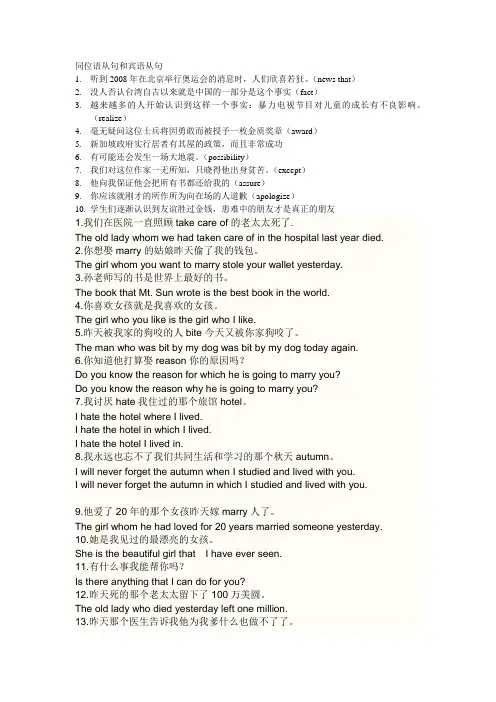
同位语从句和宾语从句1.听到2008年在北京举行奥运会的消息时,人们欣喜若狂。
(news that)2.没人否认台湾自古以来就是中国的一部分是这个事实(fact)3.越来越多的人开始认识到这样一个事实:暴力电视节目对儿童的成长有不良影响。
(realize)4.毫无疑问这位士兵将因勇敢而被授予一枚金质奖章(award)5.新加坡政府实行居者有其屋的政策,而且非常成功6.有可能还会发生一场大地震。
(possibility)7.我们对这位作家一无所知,只晓得他出身贫苦。
(except)8.他向我保证他会把所有书都还给我的(assure)9.你应该就刚才的所作所为向在场的人道歉(apologize)10.学生们逐渐认识到友谊胜过金钱,患难中的朋友才是真正的朋友1.我们在医院一直照顾take care of的老太太死了.The old lady whom we had taken care of in the hospital last year died.2.你想娶marry的姑娘昨天偷了我的钱包。
The girl whom you want to marry stole your wallet yesterday.3.孙老师写的书是世界上最好的书。
The book that Mt. Sun wrote is the best book in the world.4.你喜欢女孩就是我喜欢的女孩。
The girl who you like is the girl who I like.5.昨天被我家的狗咬的人bite今天又被你家狗咬了。
The man who was bit by my dog was bit by my dog today again.6.你知道他打算娶reason你的原因吗?Do you know the reason for which he is going to marry you?Do you know the reason why he is going to marry you?7.我讨厌hate我住过的那个旅馆hotel。
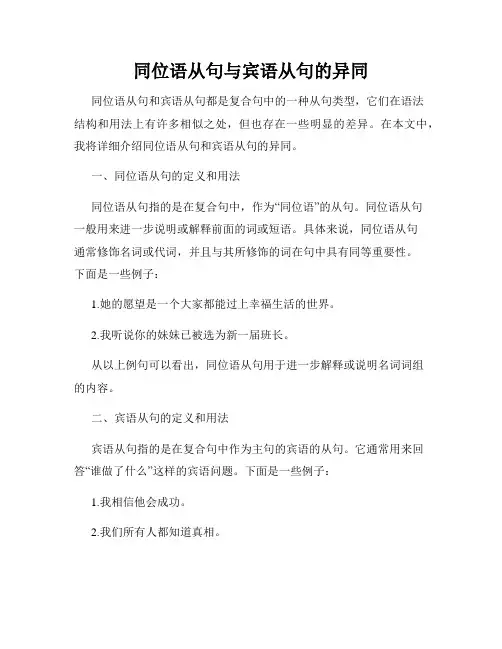
同位语从句与宾语从句的异同同位语从句和宾语从句都是复合句中的一种从句类型,它们在语法结构和用法上有许多相似之处,但也存在一些明显的差异。
在本文中,我将详细介绍同位语从句和宾语从句的异同。
一、同位语从句的定义和用法同位语从句指的是在复合句中,作为“同位语”的从句。
同位语从句一般用来进一步说明或解释前面的词或短语。
具体来说,同位语从句通常修饰名词或代词,并且与其所修饰的词在句中具有同等重要性。
下面是一些例子:1.她的愿望是一个大家都能过上幸福生活的世界。
2.我听说你的妹妹已被选为新一届班长。
从以上例句可以看出,同位语从句用于进一步解释或说明名词词组的内容。
二、宾语从句的定义和用法宾语从句指的是在复合句中作为主句的宾语的从句。
它通常用来回答“谁做了什么”这样的宾语问题。
下面是一些例子:1.我相信他会成功。
2.我们所有人都知道真相。
从以上例句中可以看出,宾语从句通常位于及物动词或介词后面,作为这些动词或介词的宾语。
三、同位语从句与宾语从句的异同1.位置不同:同位语从句通常紧跟在被其修饰的名词或代词之后,而宾语从句多数情况下位于谓语动词后面。
2.引导词不同:同位语从句一般使用连词“是”,“作为”等来引导,而宾语从句则使用连词“是否”,“那”等来引导。
3.结构不同:同位语从句作为同位语,常常用名词性质的词或短语来引导,而宾语从句则是作为宾语,引导词的选用较为灵活。
4.作用不同:同位语从句进一步解释或说明名词,而宾语从句则回答动词或介词的宾语是什么。
综上所述,同位语从句与宾语从句虽然有些相似,但在位置、引导词、结构和作用等方面存在明显的差异。
了解这两种从句的异同,可以帮助我们更好地理解和运用它们在实际写作和交流中的用法。
同位语从句和宾语从句的正确使用对于提高语言表达的准确性和丰富性至关重要。
希望本文对读者能有所启发,并在实际运用中能够灵活运用同位语从句和宾语从句,提升自己的表达能力。
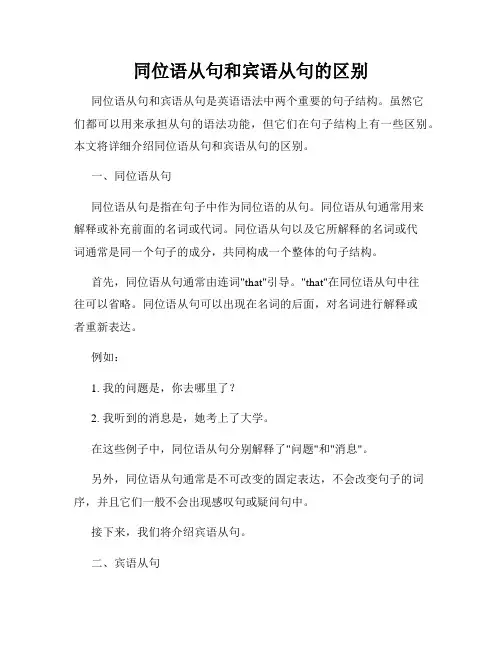
同位语从句和宾语从句的区别同位语从句和宾语从句是英语语法中两个重要的句子结构。
虽然它们都可以用来承担从句的语法功能,但它们在句子结构上有一些区别。
本文将详细介绍同位语从句和宾语从句的区别。
一、同位语从句同位语从句是指在句子中作为同位语的从句。
同位语从句通常用来解释或补充前面的名词或代词。
同位语从句以及它所解释的名词或代词通常是同一个句子的成分,共同构成一个整体的句子结构。
首先,同位语从句通常由连词"that"引导。
"that"在同位语从句中往往可以省略。
同位语从句可以出现在名词的后面,对名词进行解释或者重新表达。
例如:1. 我的问题是,你去哪里了?2. 我听到的消息是,她考上了大学。
在这些例子中,同位语从句分别解释了"问题"和"消息"。
另外,同位语从句通常是不可改变的固定表达,不会改变句子的词序,并且它们一般不会出现感叹句或疑问句中。
接下来,我们将介绍宾语从句。
二、宾语从句宾语从句是指在句子中作为宾语的从句。
宾语从句通常用来承担动词或介词后的宾语,并完成宾语从句所陈述的内容。
宾语从句和主句之间存在着一种从属关系。
与同位语从句不同的是,宾语从句并不像同位语从句那样与名词或代词构成一个整体的句子结构。
宾语从句的结构可以相对独立,它本身就是一个完整的句子。
宾语从句一般由连词"that"引导,但在口语中通常可以省略。
此外,宾语从句的位置可以出现在及物动词或介词之后,并且动词的选择通常与宾语从句的内容和意义相对应。
例如:1. 她知道你在做什么。
2. 他们问我是否同意他们的计划。
在这些例子中,宾语从句分别作为动词"知道"和"问"的宾语,完成了相应的意思表达。
综上所述,同位语从句和宾语从句虽然在语法功能上有相似之处,但在句子结构上存在一些区别。
同位语从句通常用来解释或补充名词,其结构与名词相互依存;而宾语从句则作为动词或介词的宾语,其结构相对独立。
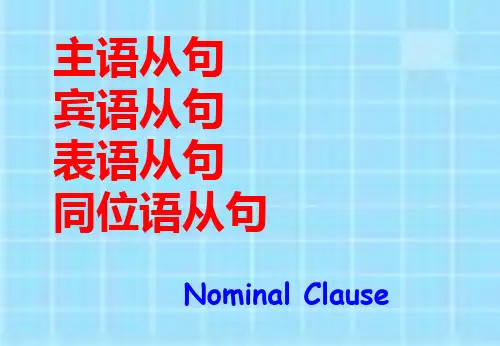
同位语从句一.定义在复合句中用作同位语的从句叫同位语从句。
它一般跟在某些名词后面,用以说明该名词表示的具体内容。
如:I heard the news that our team had won.我听到了我们队获胜的消息。
I had no idea that you were here.我不知道你在这里。
二.常见的可以跟同位语从句的词(抽象名词)news,idea,fact,promise,question,doubt,thought,hope,message,suggestion,word(消息),possibility 等.如:I've come from Mr wang with a message that he won’t be able to see you this afternoon.我从王先生那里来,他让我告诉你他今天下午不能来看你了.三.常见引导词英语中引导同位语从句的词通有连词 that,whether,连接副词 how,when,where等.(注:if,which 不能引导同位语从句。
)如:l have no idea When he will be back.我不知道他什么时候回来。
He must answer the question whether he agrees to it or not。
他必须回答他是否同意这样一个问题。
My question how I shall get in touch with him has not been answered。
I gave the girl a big doll ,exactly what she longed to have。
四、有时同位语从句可以不紧跟在说明的名词后面,而被别的词隔开。
如:Several years later,word came that Napoleon himself was coming to inspect them.几年以后,有消息传来说拿破仑要亲自视察他们。
从句小结从句总述:从句有主语从句、表语从句、宾语从句、同位语从句、定语从句和状语从句 6 类。
由于主语从句、表语从句、宾语从句及同位语从句在句子的功用相当于名词,故而这 4 种从句又通称名词性从句。
1.主语从句( Subject Clause ):用作主语的从句叫主语从句。
引导主语从句的关联词有从属连词、疑问代词、疑问副词、缩合连接代词、缩合连接副词等。
2.表语从句( Predicative Clause ):用作表语的从句叫表语从句。
引导表语从句的关联词与引导主语从句的关联词大都一样。
3. 宾语从句( Object Clause ):在句子中起宾语作用的从句叫做宾语从句. 宾语从句分为三类 : 动词的宾语从句 , 介词的宾语从句和形容词的宾语从句.4.同位语从句( Appositive Clause ):在复合句中用作同位语的从句叫同位语从句。
它一般跟在某些名词后面,用以说明该名词表示的具体内容。
其关联词多为that 。
状语从句还可以分为条件状语从句、原因状语从句、方位状语从句和时间状语从句等。
宾语从句学习宾语从句要抓住三要素:时态、语序、连接词。
一:时态和语序1·主句用一般现在时,从句可用任意时态。
2·主句用过去时,从句用过去某个时态。
3·主句用过去时,从句是真理时,只用一般现在时。
语序:宾语从句只能用陈述句语序,坚决不能用疑问句语序。
二:连接词①从属连词连接宾语从句的从属连词主要有that ,if ,whether. that 引导表示陈述句的宾语从句,而if 和 whether 引导表示“是否”的宾语从句 . 例句:He told that he would go to the college the nextyear 他告诉我他下一年上大学 .I don ’t know if there will be a bus any more.我不知道是否还会有公交车.②连接代词连接代词主要有 who, whom ,whose ,what ,whoever ,whomever ,whosever, whatever, whichever 等.连接代词一般指疑问 , 但 what, whatever除了指疑问外,也可以指陈述.例句:Do you know who has won Red Alert game你知道谁赢了这一局红警游戏吗③连接副词连接副词主要有 when,where,why,how,whenever,wherever,however等.例句:He didn ’t tell me when we should meet again.他没有告诉我什么时候我们能再见面.三:动词的宾语从句We all expect that they will win , for members of their team are stronger.我们都预料他们会赢 , 因为他们的队员更强壮.I have found out that all the tickets for the concert have been sold out.我发现这场音乐会的所有票都卖光了.make sure 确保 make up one ’s mind下决心keep in mind牢记例句:Make sure that there are no mistakes in your papers before you turn them in.在上交试卷前确保没有任何错误.四:可运用形式宾语it代替的宾语从句①动词 find,feel,consider,make,believe 形式宾语而将 that宾语从句后置.等后面有宾语补足语的时候, 则需要用 it做例句:I think it necessary that we take plenty of hot water every day .我认为每天多喝开水是有必要的.I feel it a pity that I haven’t been to the get-together.我没去聚会 , 感觉非常遗憾 . ②有些动词带宾语从句时寻要在宾语与从句前加 it 这类动词主要有 :hate,take , owe, have, see to.例句:I hate it when they with their mouths full of food.我讨厌他们满嘴食物时说话.五:介词的宾语从句用wh-类的介词宾语从句例句:We are talking about whether we admit students into our club.我们正在讨论是否让学生加入我们的俱乐部 .I know nothing about my new neighbor except that he used to work with a company.对于我的新邻居我只知道他曾在一家公司上班, 其他一无所知 .六:形容词的宾语从句一般来说形容词不能带宾语,更不能带宾语从句。
复合句【语法要点】复合句是由一个主句加一个或几个从句所构成的句子。
从句只用作句子的一个成分,不能独立。
根据从句在句子中的作用,可分为名词性从句、定语从句和状语从句三类。
(一)名词性从句名词性从句包括主语从句、表语从句、宾语从句、同位语从句。
其关联词有连接词that、if、whether;疑问代词who、what、which和疑问副词when、where、how、why等。
1.名词性从句句法结构:2.名词性从句的其它用法:1)if不能引导表语从句。
连接代词who、what、whose、which不能引导同位语从句。
2)有时as、as if/though、because也可以引导表语从句,能跟表语从句的谓语动词一般为系动词be、seem、look等。
例如:Things are not always as they seem to be.事情并不总是像表面上看来的那样。
It looks as if it were going to rain. It is because you eat too much.3)介词宾语不可以用which来引导,而要用what来引导。
例如:We can learn what we did not know. He will talk to us about what he saw in the .4)连词that引导的名词性从句除能用在except、but、in后之外很少作介词的宾语,。
其它一些介词的宾语从句如果由连词that引导,则需用it先行一步作形式宾语。
例如:He is a good student except that he is careless.You may depend on it that they will support you.5)若主句谓语动词是及物动词make、find、think、see、hear等,则把宾语从句置于宾语补足语之后,用it作形式宾语。
宾语从句与同位语从句学习宾语从句和同位语从句的区别和用法一、概念解析宾语从句和同位语从句是复合句中较为常见的两种从句结构,它们分别在句子中担任不同的成分,具有不同的语法功能。
本文将着重介绍宾语从句和同位语从句的定义、区别和用法。
二、宾语从句1. 定义:宾语从句是一个被包含在句子中作为主句的宾语的从句。
它可以由连接词引导,充当及物动词或介词后的宾语,用来说明或补充主句的核心意思。
2. 区别:与主句之间通过一些连接词进行联系,如that, whether, if, who, whom, whose, what, which, when, where, why等。
3. 用法:宾语从句在句子中可以充当不同的语法成分,例如:(1)宾语补足语:I think that he is a teacher.(I think后的宾语从句作为宾补)(2)宾语:She asked me whether I could help her.(宾语从句作为及物动词ask的宾语)(3)介词宾语:I am not sure about what he said.(宾语从句作为介词about的宾语)三、同位语从句1. 定义:同位语从句是修饰名词或名词性短语的从句,用来解释、说明或补充名词的具体内容,常常出现在观点、态度、信念等名词后面。
2. 区别:同位语从句与宾语从句的主要区别在于句子所修饰的名词不同,同位语从句是修饰名词,而宾语从句是修饰及物动词、介词等。
3. 用法:同位语从句通常由连接词that引导,也可以是其他连接词,如whether, where, when等,例如:(1)观点/动态名词后的同位语从句:The fact that he passed the exam surprised me.(同位语从句修饰fact)(2)特定名词后的同位语从句:Her belief that hard work pays off is inspiring.(同位语从句修饰belief)(3)特定名词及介词后的同位语从句:I have no idea of what he is talking about.(同位语从句修饰idea,介词of之后)四、宾语从句与同位语从句的区别1. 修饰对象不同:宾语从句修饰及物动词、介词等,而同位语从句修饰名词或名词性短语。
同位语从句和宾语从句的详细区分同位语从句和宾语从句是英语语法中两个重要的句法结构。
虽然它们都属于从句,但它们在语法功能和用法上有着明显的差异。
本文将详细区分同位语从句和宾语从句,并从语法结构、引导词、意义和用法等方面进行解析。
一、同位语从句的定义及特点同位语从句是指在名词或代词后面用以解释或说明该名词或代词的从句。
它的作用是对名词或代词进行进一步的解释、说明或补充。
同位语从句与主句之间往往存在着平行的关系。
同位语从句的引导词通常有“that”、“whether”、“if”等,它们在从句中起连接作用。
同位语从句常用于表示观点、证明、描写等方面,用以加强语气或补充信息。
例如:1. I have no idea whether he will come or not.(我不知道他是否会来。
)2. The fact that he passed the exam surprised me.(他通过了考试的事实让我吃惊。
)3. Our hope is that the new project will be successful.(我们的希望是新项目会成功。
)二、宾语从句的定义及特点宾语从句是指在句子中作动词的宾语,并且在结构上是一个完整的句子。
它的作用是接受动作的影响,表达说话人对一个事实、看法、意愿或建议等的陈述或询问。
宾语从句的引导词通常有“that”、“whether”、“if”、“what”、“who”等,根据不同的引导词,可以表达不同的含义和作用。
宾语从句常用于陈述性动词、描写性动词、感知性动词、思维性动词等后面,用以表达说话人的意向、观点、看法等。
例如:1. She didn't know what he was talking about.(她不知道他在说什么。
)2. I wonder if/whether he can come to the party.(我想知道他是否能来参加派对。
同位语从句和宾语从句的详细对比同位语从句和宾语从句是英语语法中常见的两种从句结构。
它们在句子中扮演不同的角色和功能,因此对它们进行详细的对比分析能够帮助我们更好地理解和运用。
一、同位语从句同位语从句是指在主句中作为名词的同位语的从句,用来进一步解释或说明名词的内容。
同位语从句通常使用连接词that引导,但在口语和非正式场合中常省略that。
1. 定义和功能:同位语从句用来对前面的名词进行解释、说明、或进一步补充信息。
例如:Our belief that hard work leads to success is widely accepted. (我们相信努力工作会导致成功的观念被广泛接受。
)2. 结构和特点:同位语从句常以that引导,但也可以省略。
它在句子中的位置通常紧跟在前面的名词后面。
例如:The fact that she passed the exam made us happy. (她通过了考试的事实让我们很高兴。
)3. 例句:a) My hope is that we can achieve world peace. (我希望我们能够实现世界和平。
)b) The announcement that the party is cancelled disappointed many people. (派对取消的通知让很多人感到失望。
)二、宾语从句宾语从句是指在主句中作为宾语的从句,用来充当动词或介词的宾语。
宾语从句通常使用连词that引导,但在口语和非正式场合中也可以省略。
1. 定义和功能:宾语从句用于替代主句中的宾语,起到进一步补充、说明或解释的作用。
例如:He asked me if I had finished my homework. (他问我是否完成了我的作业。
)2. 结构和特点:宾语从句以that引导时可以省略,但以其他连接词时通常不省略。
它在句子中的位置通常紧跟在主句中的动词或介词之后。
名词性从句的关联词引导名词性从句的连接词可分为三类:连接词:that, whether ,if (不充当从句的任何成分)连接代词:what, whatever, who, whoever, whom, whose, which连接副词:when, where, how, why1.引导名词性从句的关联词有;连接词that, if, whether; 连接代词who, what, which; 连接副词when, where, how, why等。
1.1 that连词that本身没有意义,在从句中不担任任何句子成分,在宾语从句中有时可省略。
I hear (that) he has joined the football club.That light travels in straight line is known to all.It so happens that I know the man.Is it certain that they will win.1.2 whether和if 做连接词1.2.1 whether可以连接所有的名词性从句,而if只能引导宾语从句。
I didn't know whether he would attend the concert.(宾语从句,可用if代替whether)The question is whether it s worth trying.(表语从句,不可用if代替whether)Whether she comes or not makes no difference.(主语从句,不可用if代替whether)He must answer the question whether he agrees to it or not.(同位语从句, 不可用代替)1.2.2 whether引导的宾语从句可作介词的宾语,而if则不能。
It all depends on whether they will support us. (不用if)Ryan was worrying about whether he had hurt her feelings. (不用if)1.2.3 if既可引导直接宾语从句,也可引导间接宾语从句。
如果用if会引起歧义,应避免使用if,而用whether。
Please let me know if you want to join us. (if从句可被看成是宾语从句,if表示是否)Please let me know if you want to join us. (if从句可被看成是条件状语从句,if表示如果)Please let me know whether you want t join us.(为避免引起歧义,可用whether 表示是否)1.2.4 从句后有“or not”时I wonder whether he will come or not.1.2.5后接动词不定式时。
Can you tell me whether to go or to stay?1.3 who, whom, whose, what, which连接代词who, whom, whose, what, which等在从句中既起连接作用,同时又担当主语、宾语、定语、表语等成分。
No one knows who he was waiting for.We are worrying about what we should do next.Tell me whose house it is.Let me know which train you will be arriving on.1.4 where, when, how, why连接副词where, when, how, why等在从句中既是连接词,又作状语。
I don't know where we are going to have the meeting.She always thinks of how she can work well.What I am anxious to know is when we can visit the museum.比较:when引导的时间状语从句和名词性从句中的不同时态。
Please let me know when you arrive.(when引导时间状语从句,用一般现在时来表示将来。
)Please let me know when you will arrive.(when引导的是宾语从句,从句中用一般将来时。
)1.5whoever, whomever, whatever, whichever, whoever连接代词whoever = anyone who任何人, 无论谁;whatever =anything that凡是...,无论什么;whichever = anything that无论那一个, 任何一个;whomever = anyone whom (whoever的宾格形式)。
Whoever comes to the club is welcome.Whatever is worth doing at all is worth doing well.They ate whatever they could find on the deserted island.You may do whatever you will.I'll take whichever book interests me.Whosever book is overdue will be fined.比较:连接代词whoever在宾语从句中作主语,whomever作宾语从句中宾语。
You may offer the book to whoever wants it. (此句中不能使用whomever,因为whoever在宾语从句中作wants it的主语)You may offer the book to whomever you like(whomever在宾语从句中作you like的宾语)1.6 “疑问词+不定式”的功能:在句中可作主语、宾语、表语等成分。
1.6.1 作主语How to give advice in English is what I am trying to learn.1.6.2 作宾语1.6.2.1 作动词的宾语We have to start somewhere if we want to learn how to write plays.1.6.2.2 作介词的宾语We had better learn to make the right choices about what and how to eat.When you are trying to advise someone about what to do or what not to do, you can use should / ought to or should not /ought not to.1.6.3 作表语My question is where to find the answer.1.6.4 从以上可以看出,“疑问词+不定式”构成的短语在句中相当于“名词”,因此有些可以转化成相应的从句。
I am not sure how to behave at the dinner table.= I am not sure how I should behave at the dinner table.1.6.4.1这种结构中,疑问代词须接及物动词或相当于及物动词的短语(who, which 除外)I don't know what to talk. (×)I don't know what to talk about. (√)We haven't decided who (which) to go. (√)1.6.4.2 这种结构中的疑问副词后要接不及物动词;若接及物动词, 要有动词的宾语。
I don't know how to talk.I wonder if you could tell me how to do it. (不能说: ... how to do.)1.7注意:1.7.1 wonder 后面的宾语从句I wonder if (whether) 意为“想知道,不知道,纳闷”,可表示婉转的请求。
I wonder if you can help her.I wonder that从句意为“对…….感到惊讶”I wondered that nobody believes the news.1.7.2 doubt (名词、动词)后面的同位语从句或宾语从句:肯定句中一般用if 或whether引导,在否定句和疑问句中用that引导。
I doubted if \whether he really knew the answer.I have no doubt that she was ill yesterday.= I don’t doubt that she was ill yeaterday.Do you doubt that she was ill?There is no doubt that he was ill.1.7.3 sure后面的宾语从句I am sure 后面的宾语从句用that引导,但也可以省略that.I am not sure 后面用whether, if wh-疑问词引导。
I am sure that he won the game.I am not sure if\whether he won the game.I am not sure when he arrived in Beijing.I am not sure where he will go.1.8 that 和what 做连接词时的区别That 不做任何成分,而what 做主语,宾语,表语等。
What I want is money and food.That he is still famous is a fact.3. 宾语从句在复合句中用作宾语的从句叫宾语从句。
3.1 连接词3.1.1 that 引导的宾语从句I hear (that) the president will visit our school next month.3.1.2 whether/if 引导的宾语从句(此两个引导词的区别见连接词部分说明)I didn't know whether / if he would attend the concert.3.1.3 what, which, who, whom, whose 引导的宾语从句After the examination, we don’t know what we should do.I can’t tell which one is right.He was not sure who was right./ whose cloth it was.3.1.4 when, where, why, how引导的宾语从句I don’t know when and where we will go.I don’t know why he is absent today.I know how he solved this difficult problem.上述句子某些往往可以简化为由上述连接词后跟to do 结构。